Back in Black (McGinnis Investigations Book 1) Read online
Page 4
“No. I mean I need a new jacket. My old one got eaten.” A more thorough explanation was apparently needed, because Bobby gave me an odd look. “I just want a black leather jacket. Once we’re done here, I can swing by a shop, and you can verify it’s black when I buy it. That way Jae doesn’t give me the hairy eyeball when I come home with it.”
“You need your husband’s permission to… oh, the Easter-bonnet jacket,” Bobby snickered. “Yeah, I can do that for you, Princess. Though why he’d think you couldn’t figure out something was black—never mind, I wouldn’t trust you either. How they ever let you be a cop, I don’t know. Can you tell which one is the green light? Should you even be driving?”
I lifted my hand to knock on the front door, muttering at Bobby under my breath, “Fuck you. I drive—”
Gunshots blew the glass insert out of the door, and I lunged at Bobby, taking him down to the porch’s painted wooden floor. Shards and splinters rained down on our heads, and it took me a moment before my brain processed someone was seriously trying to kill us. I shoved at Bobby to crawl away from the line of fire, and he flipped over onto his side, glaring at me.
“Where’s your gun?” he shouted, trying to be heard over another round. Car alarms were going off, and somewhere, someone was screaming at the top of their lungs in full-out terror. Thankfully, I didn’t seem to be the one who was screaming.
“I don’t have a gun!” Of course I yelled that back during a long stretch of silence so the shooter could probably hear me quite clearly.
“Why the fuck don’t you have a gun?” Bobby pushed me off of his legs and began to scramble backward.
“Because I didn’t think I would need a gun to talk to an old man about his dead wife!” Another shot blew out the top of the doorframe, and I weighed the risks of putting myself in the line of fire to get to the steps leading to the yard. “Stay away from the windows. Try to get off the porch.”
Bobby took a way out I hadn’t even considered, launching himself up off of the floor and over the hip-high decorative stucco wall surrounding the porch. It had a wide enough sill to provide him leverage to catapult over. It seemed a lot closer and safer than the steps, and I went over the same wall a second later.
He landed in a bush.
I landed in the cluster of cacti.
“Fuck!” Swearing didn’t help the prickles of pain along my thigh and arm where the oddly fuzzy-looking cactus pierced through denim and leather. Rolling off left me clear of any more thorns, but it still smarted like hell, and I’d somehow torn my second-best jacket on something sharp in the flower bed. “Bobby, you okay?”
“Yeah.” He was already up in a crouch, scanning the area around us, and I reluctantly followed, feeling every burr and bruise I’d collected over the last twenty-four hours. “Sounds like the shooting stopped.”
I didn’t hear any sirens, but that didn’t mean the LAPD wasn’t on their way. Torn between staying down and not being mistaken by the cops as the shooter or going in to check on the state of my potential client, I poked my head up just in time to see denim-clad legs sprint across the porch and down the steps.
“He’s doing a runner,” I shouted, taking a long stride forward to give chase. But Bobby grabbed me by the back of my jeans.
“I’ll go. You go check on the old man,” he ordered, already on the move. “Call 9-1-1! Make sure they know you’re in the house.”
There was no arguing with him. There never was. I took the stairs two at a time, realizing I’d dropped my phone somewhere when I couldn’t find it in my pocket, but I was betting the house phone would work. The Brinkerhoffs were of an age where being without a landline was inconceivable, or at least I was going to bank on that. The inside of the house was dark, the curtains drawn tight against any sunlight, and the plaster walls were burdened with a deep honeyed-oak wainscoting and crown molding. The lack of light dragged the walls down to the floor, shortening the high ceilings above my head.
The foyer was like the one in our house—opening into a wide archway on either side leading to a massive front room to the left and the kitchen on the right. I could see the remnants of an elegant-yet-comfortable living space, blossoms of doilies scattered about the floor, mimicking a spray of tulips lying among the ruins of a cut-glass vase. The davenports were a taupe velvet and sliced apart, the fabric cut so thin I wondered if our assailant was a sashimi master. A wooden coffee table as heavy as the darkness in the room sat up on its edge, one of its legs smashed and dangling from a single bolt.
A glance toward the kitchen told me there was as much chaos wreaked in there as the living room, heavy crocks of flour, sugar, and salt bashed to smithereens on a sea of red Spanish tile. The refrigerator doors were open, and the freezer’s contents were scattered about on a small round table set into an eating niche. Our shooter had taken the time to tear open bags of frozen vegetables and dump out everything onto the floor and counter. Ice cube trays were emptied, the cubes left to melt on the cushions of the kitchen chairs. All of the drawers were upended, mingling silverware with the flotsam and jetsam people gathered in their kitchen’s nooks and crannies.
I stood still and listened. Then I called out Brinkerhoff’s name, the echoing stillness in the shattered house staining my panic with fear. A low moan came from down the hall, and I sprinted toward it, snagging a cordless phone from the side table as I went by. I dialed 9-1-1 mostly by feel and dropped the phone on the floor when I entered the small room at the back of the hall.
Arthur Brinkerhoff was beneath a mattress, his frail shaking body pinned down by its heavy weight. Dark purple splotches marbled the papery skin stretched over his finely boned skull, a fringe of white hair circling the back of his head and spotted with blood. His lip was swollen and split, black speckles clinging to the corner of his mouth, and his eyes were crazed when I pulled the bed off of his chest.
The man was a fighter. I had to give him that, because as I crouched over him to pull him out of the mess he’d been trapped under, he gave me a solid left hook across my nose. I saw enough stars to qualify as a planetarium, but other than a little bit of ringing in my ears, it felt like my sinuses were still intact. I grabbed at his flailing arms, securing his wrists in a loose hold, mostly because I was afraid if I gripped too tight, I would shatter his delicate bones.
He was a lot older than I remembered, dotted with age spots and worn with grief. His baggy brown pants were dark across the crotch. The stink of stale urine hit me in the face. I didn’t know how long he’d been under that mass, but it couldn’t have been more than a few hours. I’d only spoken to the man that morning, but he was lost somewhere, trapped in a terrified maze with no anchor to pull him free.
“Arthur,” I practically shouted into his face, hoping to shake some reason back into his unseeing eyes. “It’s Cole McGinnis. You called me. You’re safe now.”
“McGinnis.” His watery eyes fixed on my face, and he grabbed at my shirt, his surprisingly strong grip stretching out the cotton fabric. He swallowed hard, and tremors shook through his thin arms, rattling his chest and legs as shock rippled through him. “You’ve got to save my Adele. They’re trying to take everything I have left of her. You’ve got to stop them. Please.”
Four
“I SWEAR to God, Los Angeles would be a safer city if I just threw you in jail,” O’Byrne snapped, shoving her jacket back with a flourish and planting her feet into a firm stance. “I’m pretty fucking sure criminals would break in just to beat the shit out of you.”
“Just charge admission so I can have a water bed,” I grumbled back, fidgeting on the short wall enclosing the Brinkerhoffs’ front lawn while an EMT cleaned out one of the cuts in my forehead. He’d already picked out a couple of chunks of glass, closing the tiny wounds with butterfly bandages, but from the clicking of his tongue against the roof of his mouth, I was going to be there for a little bit. “And I’ll need conjugal visits. At least once a day. Three times on Saturday.”
“Three?” The EMT�
�s eyebrows lifted. Smirking, he shook his head. “Your girlfriend must be hot or your ego’s bigger than you are.”
“My husband is hot, and I need the three times to keep him happy.” I hissed at the sting of antiseptic on my cut flesh. “Saturday’s when we do laundry. Pretty sure those three times will be me folding clothes.”
They’d taken Arthur Brinkerhoff away only moments ago, strapped down to a gurney and wrapped up in a thin blanket to fight off the shock bleaching his skin to a grayish white. Bobby was being interviewed by a stern-looking detective named Bishop, his eyes drifting off over her shoulder as he watched the crime-scene techs begin to go over the shot-up porch with a fine-toothed comb. I studied the techs for a minute but couldn’t see what had Bobby so entranced. For all I knew, he was planning dinner and taking a mental inventory of what he had in his freezer.
“You about finished up there? I’ve got some questions for him,” O’Byrne growled at the EMT. “Assuming he’s got any brains left, because I wouldn’t be surprised if they slithered out of that hole in the back of his head.”
“You know, if I wanted to be abused like this, I’d be sitting at my desk, letting my office manager take shots at me,” I grumbled back. The medical tech laid one last Band-Aid down and declared me fit to drive home. “At least there I get pie.”
The wall was covered with the same stucco that was wrapped around the house’s exterior, minus the bullet holes. It was wide enough to straddle, but it had to be done carefully because one of the Brinkerhoffs really liked succulents, planting more of the prickly beasts on the inside of the wall. I’d tossed my ruined jacket into the Rover’s back seat, and the EMT plucked a few short thorns out of my flesh before moving on to the glass bits. I didn’t know where the bullets went, but a quick inspection of my SUV reassured me it hadn’t been hit. I couldn’t say the same for a gleaming black sports car parked in front of the Brinkerhoffs’ house. It took the brunt of the shoot-out with two shattered windows and a deep crease across its roof. It didn’t look like the kind of car Arthur Brinkerhoff would drive, but California was a car-mad state, and oftentimes people drove the most unexpected things.
Since Arthur had married Adele with her odd proclivities, maybe he was really into unexpected things. Hopefully I would have the chance to ask.
“Did they give you a prognosis on Brinkerhoff?” I asked O’Byrne. “Guy was beaten up pretty badly. What kind of asshole beats up an old man?”
“You were a cop. You should know what assholes can do,” she replied, standing on the lawn but avoiding the bristle of cacti starting along the wall about six inches behind my foot. I had to twist to clearly see her expression. Then, after a warning twinge from the scar tissue along my ribs, I pulled my leg over the wall and sat facing her. “And Dawson is your best friend. That’s like having a ringside seat to the Asshole Circus.”
If my brother Mike hadn’t already married his wife, Mad Dog, I could have seen him with O’Byrne. She was the kind of woman who could haul in a hundred-pound tuna during a deep-sea fishing trip, then after a quick shower, slide into a copper sheath dress for an elegant night on the town. If I liked girls—and I wasn’t scared to death of her ripping my head off like a praying mantis—I would’ve asked her out. I probably wouldn’t have survived the experience, but I’d have given it my best shot. Because it would’ve been a good way to die.
We were almost friends. At the very least, colleagues who respected each other at some level. I’d been helpful to her in the past as a consultant, and she’d eased my way through a couple of cases with some pertinent information. But I was pretty sure she was tired of seeing me in the middle of her investigations, especially since I seem to show up without her asking me to be there.
“Give me the rundown on the old man,” she said, her eyes resting momentarily on my face as she angled her body, moving to allow the crime-scene techs a bit more space to walk by and giving her the opportunity to watch them work. “You said he called you?”
“Yeah. I got the impression he didn’t have a lot of faith in the LAPD solving his wife’s murder.” I shrugged at her fierce glare. “Don’t look at me. I’m just telling you what happened. I told you last night I felt some kind of obligation to them. It’s not like I expected to get shot at when I arrived.”
“Was there any warning at all? From the shooter?”
I had to stop and think about what happened, slowing the incident down in my mind and sifting through the stuttering fragments of memory. The brain does funny things when hyped up on adrenaline and fear. It takes slices out of events, sometimes long stretches where everything slows down and you can see every grain of time. But most often you’re more likely to be left with bursts of things—a bit of a loud boom, the spark of the muzzle flash, or the shocking heat of blood hitting the skin. There wasn’t anything I could find in the microfilm-like spools embedded in my brain. What dominated the memory was my concern for Bobby and then me being pissed off about ruining yet another jacket. It was a stupid fixation, but sometimes that’s just how the mind worked. It grabbed at the things that it could handle, sloughing away the moments too incredibly overwhelming to hold on to.
Still I searched, looking for any small clue vivid enough to stand out as a warning.
“Not really. And when the guy went by, I didn’t get a good look at him. Just sneakers. Casually dressed. Maybe a hoodie.” I snorted a brief laugh, glancing across the street where a studio squatted across a good stretch of the neighborhood. “I don’t think he was an assassin. Don’t those guys get dressed up to go out to work? Italian suits and polished loafers? And why was he tuning up Brinkerhoff? The place was tossed, but it didn’t look like he was carrying anything when he went by us.”
“Those are all questions I’ve got but no answers. I was kind of hoping you had some.” O’Byrne’s eyes narrowed when one of the techs began working on the sports car. “I’m wondering if that vehicle belongs to our shooter. There’s a garage in the back, off of an alleyway. It’s got a couple of cars in it. We’re going to run the plate and registration, but something tells me that piece of flash isn’t going to belong to our victims.”
“I was thinking the same thing, but you never know. Jae’s been lusting after vintage Mustangs lately. I blame my brother Ichi for that. For all we know, Mrs. Brinkerhoff’s tastes ran to sleek and fast.” I met Bobby’s eyes, and he frowned at me, trying to tell me something silently, but I couldn’t figure it out. “I really don’t have anything to give you, O’Byrne. I didn’t talk to him for very long on the phone, and he was out of it when I pulled the mattress off of him.”
“There’s too many odd threads in this. Something is going on, and I’m going to find out what that is. I’ve got a dead woman dressed in leather with a handful of diamonds lying in the backyard of an expensive mansion with nobody in the area reporting a robbery, and now I’ve got you and your buddy, Bobby, walking in on some guy working over the dead woman’s husband. Then you’re telling me he’s probably not going to talk to the cops, so that’s just another wall I’m going to have to climb on this case. Do me a favor. Whatever you dig up, I want you to call me. I don’t care how small it is or if it looks like it’s not connected to anything. You call me.”
“What makes you think I’m going to dig something up?” I hadn’t given much thought about what I would do after she cut me loose, but something wasn’t sitting right in my guts. I just hadn’t had time to dig through it and figure out what. “Technically, he’s not even my client.”
“I know you, McGinnis,” she replied with a smile crocodiles would envy. “You’re going to slink off back to wherever your kind holes up and chew on it until you decide justice needs to be done. Then you’re going to fall headfirst into whatever cesspool this case crawled out of. So I want to know your every step along the way, because I don’t want that husband of yours to buy his Mustang out of a life insurance payout.”
I didn’t like being that predictable, but she wasn’t wrong. I hated the feel of ho
w weak Brinkerhoff looked when I pulled him out of the pile he was buried under, and the angry black-purple bruises on his arms and face stuck with me. He’d been beaten pretty badly, to the point where I was worried if he would make it through the night. He was old and at an age where the body couldn’t take that kind of damage. But like O’Byrne, I didn’t have anything to go on.
“You’re that sure I’m not going to leave things well enough alone?” I snorted. “Not like somebody’s going to drop into my lap with a lead. The old man didn’t even tell me what he wanted to talk about.”
“Yeah, I’m that sure,” she replied, a knowing smirk on her lips. “Here’s a hint. Why don’t you go look up Montoya’s boyfriend. You know, the guy who hired you for the job? Also not so big on talking to the cops. Maybe you should go digging around there. You might be surprised at what you find out. Just remember you’ve got my number, McGinnis. Be sure to call, because I’m going to come after your ass if you don’t.”
THERE WERE spots of Los Angeles that rarely saw the sun, and in the densely packed maze of beautiful buildings lining Downtown’s streets, it wasn’t hard to see the bones of a bygone era. There were entire blocks of stone and metal whose shadows held the ghosts of noir detectives and gum-snapping dames. Downtown wasn’t where tourists came to see the glitter of Hollywood or the beaches running up and down the 101. There were a few here and there, drawn to places like a bookstore with a tunnel made of sculpted novels or the Symphony Hall built out of steel and resembling a piece of origami made by a one-eyed drunk raccoon. I wasn’t a fan of the building. It sat above Little Tokyo like a giant mutated metal mushroom, waiting for Alice to come by and take a bite out of it so she could grow smaller or perhaps slip back through the looking glass.
Downtown Los Angeles was the beating heart of the city, stitched together from bits and pieces of the people who’d wandered there. Some souls were looking for a dream they would never fulfill while others were simply looking for a way to escape a drab, dreary life. It was a harder city than a lot of people imagined. Nobody really knew what waited for them on the star-studded sidewalks. As beautiful as the face Los Angeles wore was, much of it was theater paint, smoke and mirrors hiding her bloodied fangs and wretched soul. Still, I did love her. She was vibrant and flamboyant, with rotted parts we all struggled to cut out, as if somehow we would be able to cure her of the cancer humanity brought to eat her alive.

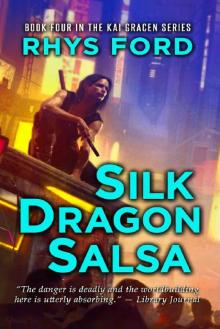 Silk Dragon Salsa (The Kai Gracen Series Book 4)
Silk Dragon Salsa (The Kai Gracen Series Book 4)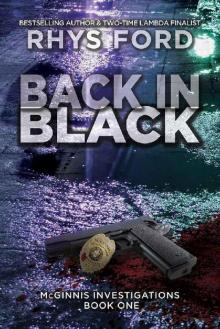 Back in Black
Back in Black Black Dog Blues
Black Dog Blues Wonderland City
Wonderland City Bound: Chinatown Demons, Book One
Bound: Chinatown Demons, Book One Hellion
Hellion 'Nother Sip of Gin
'Nother Sip of Gin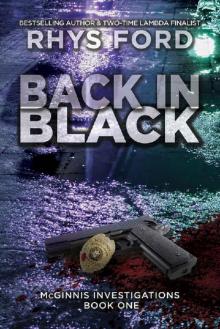 Back in Black (McGinnis Investigations Book 1)
Back in Black (McGinnis Investigations Book 1) Hanging the Stars
Hanging the Stars Ramen Assassin
Ramen Assassin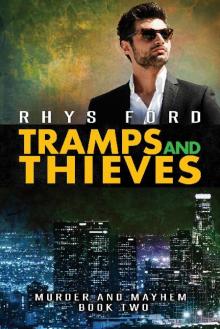 Tramps and Thieves
Tramps and Thieves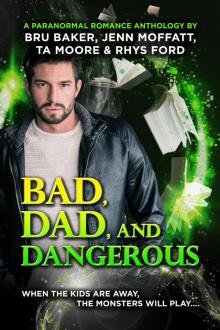 Bad, Dad, and Dangerous
Bad, Dad, and Dangerous Tutus and Tinsel
Tutus and Tinsel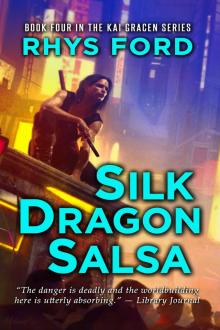 Silk Dragon Salsa
Silk Dragon Salsa Jacked Cat Jive
Jacked Cat Jive Ink and Shadows
Ink and Shadows Once Upon a Wolf
Once Upon a Wolf Mad Lizard Mambo
Mad Lizard Mambo Whiskey and Wry
Whiskey and Wry Dirty Secret
Dirty Secret Dirty Laundry
Dirty Laundry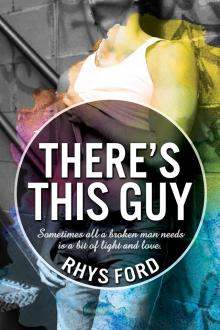 There's This Guy
There's This Guy Savior
Savior Rebel
Rebel Dirty Kiss
Dirty Kiss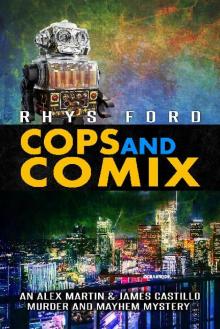 Cops and Comix
Cops and Comix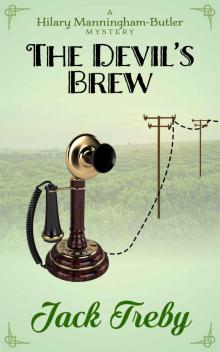 The Devil's Brew
The Devil's Brew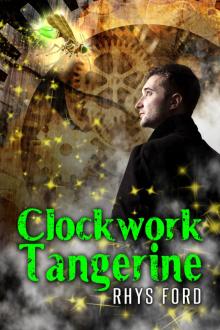 Clockwork Tangerine
Clockwork Tangerine Sinner's Gin
Sinner's Gin Sin and Tonic
Sin and Tonic Dim Sum Asylum
Dim Sum Asylum